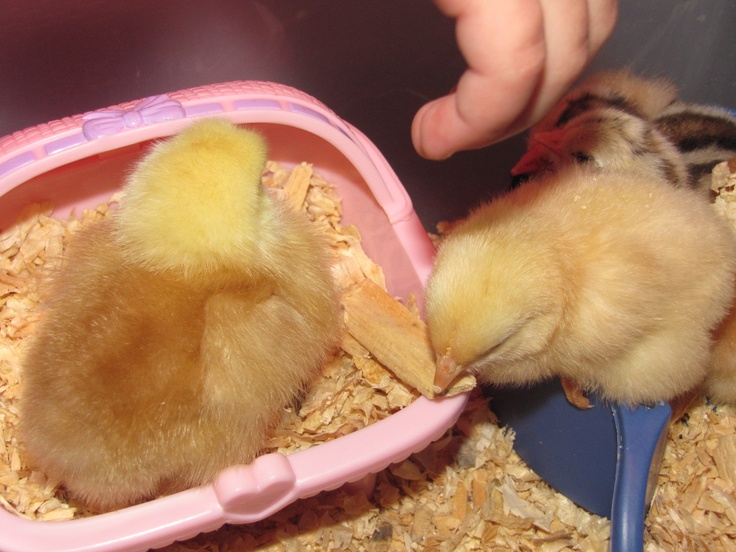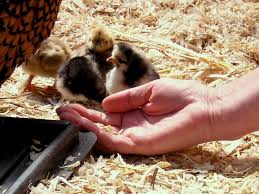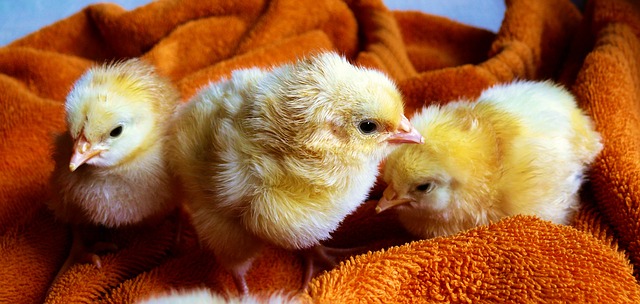Even if you’re not planning on breeding your own chickens, you will probably find yourself raising baby chicks sooner than you think. While you can start a backyard flock by buying adult birds, it is cheaper to order babies from a day old chickens hatchery. You can also find baby chickens for sale from a small local breeder. By raising baby chicks yourself you’ll end up with hens that are more friendly. Plus you’ll know their whole history from day one. Well, from day two anyway.
Raising Baby Chicks Timeline
To help you understand what to expect day to day and week to week, we’ve put together a timeline for raising baby chicks.
Before Chicks Arrive
It is important to prepare for raising baby chicks by setting up a brooder. This can be a simple cardboard box or plastic tote. It should have a heat lamp. Regular lights work fine but can be dangerous if left unattended. You should have a feeder and waterer prepared. The floor of the brooder shouldn’t be slick (the bathtub is a bad choice). If chicks slip they can become spraddle legged and unable to stand.
Day 1: Getting Started Raising Baby Chicks
The brooder should be between 90-95° F. The chicks need to drink, and may not know how. Raising baby chicks means playing mother hen sometimes. Dip each chick’s beak in the water and show her how to drink. Make sure she understands or she may die. Repeat later with their feed.
Week 1: Sleepy Babies
Like any baby, a chick sleeps a lot. Make sure they have clean food and water, and don’t expect much action. At this age it is common for chicks to get “pasty butt”, which occurs when sticky feces clog the anus. Soak the chick’s bottom with a warm, wet paper towel to remove the plug.
Week 2: Raising Baby Chicks to be Friendly
Expect to see the first real feathers peeking through the baby down. Decrease the brooder temperature to 85°. When raising baby chicks it is important to watch their body language. They will huddle together if cold and hang out in the corners far from the heat lamp if they are too hot. You can add shavings to their brooder for bedding, add a small roost and begin socializing the chicks if you want them to be friendly adults.

Image courtesy of centralmaine.com
Week 3: Keep the Lid On
Your chicks will be growing fast. You may need to switch to a larger brooder or keep a lid on it so they don’t escape. Decrease the temperature to 80°F. You can start feeding healthy treats and scraps little by little.
Week 4: Raising Baby Chicks Outside
Your chicks are big enough to venture outdoors on nice days. The brooder temperature can come down to 75°F. Don’t let them catch a chill outdoors.

Image courtesy of youtube.com
Week 5: Teen Chicks
You can take the heat lamp away now, as long as nighttime temperatures don’t drop below 60°F. Start mixing some adult chicken feed into the feeder. You may be able to sex the chicks at this point.
Week 6: You’re Done Raising Baby Chicks
It is time for the big move into the coop. Let them get acclimatized slowly, and keep a careful eye on them if there are other chickens in the coop to make sure no one gets beat up.
Week 17-27
You’ve done the hard work of raising baby chicks, and now you get to enjoy the eggs. Depending on the breed, your pullets will begin laying between 17-27 weeks of age. Provide extra calcium in the form of crushed oyster shells in the weeks leading up to their first eggs. Provide a nesting box for every three hens, and try placing a fake egg (a golf ball works well) in the nests to encourage them to lay there.
For your other poultry and farm needs visit Thechickentractor.com.au

Experience and Learn Egg hatching with the 12 Day Chicken Hatching Program
Recommended for Early Learning School centers, Aged Care, different companies and at homes for personal learning experience. Providing Chicken Programs Since 2001 to Sydney, Central Coast, Canberra and the Illawarra.
BOOK Your Chicken Hatching Program here.
Extended Reading
Guide to Backyard Chickens & How to Raise Chickens
Jim Thomas shares his advice on raising baby chicks.

